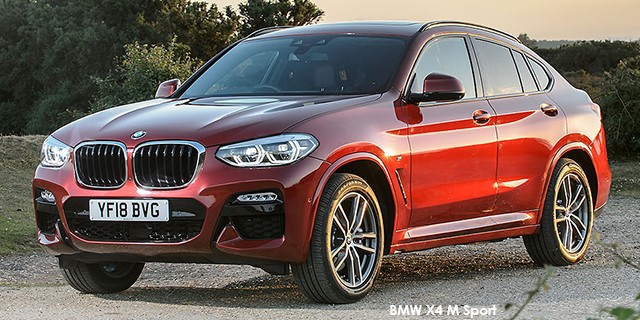BMWs entry-level X4 has plenty of show but not as much go as you’d expect at the price...
When BMW unveiled its first-generation X6 about 10 years ago, its oddball combination of coupé and SUV had many of us questioning whether the Bavarian brand’s product developers (not least designers) had lost their marbles. As it turned out, they created a successful niche product for moneyed, style-conscious buyers within an already burgeoning SUV segment.
Then BMW decided the coupé-SUV concept should filter down into its more compact offerings, spawning the more affordable and practically proportioned X4, which garnered about 200 000 sales globally. Arch-rival Mercedes-Benz duly followed suit, of course, and, while the coupé-SUV niche remains just that, the Coupé versions of the Stuttgart marque’s GLE and GLC offerings have, albeit belatedly, been well met by the motoring public. Now, with an eye to defending the territory it had staked for itself, BMW has launched an all-new X4. But, while its on-paper rival may hail from the Three-pointed Star, its real competition is closer to home.
As daring a tilt at the coupé-SUV competition as the previous X4 represented, it had a certain ungainliness to its nose and tail that sat at odds with the billowing sheetmetal of its midriff. While not a massive departure from the original coupé-SUV formula, the new car is, visually, a more polished affair. Up front, it’s similar to the X3 in its execution, but the rear aspect is altogether more appealing than that of its forebear; its mere slivers of taillamp clusters and narrow rear glazing lend it a purposeful and visually better-resolved air.
The G02-generation X4 is underpinned by BMW’s wide-ranging CLAR modular platform, bringing with it a 54 mm increase in wheelbase length (from the previous car’s 2 810 mm). That gain may not sound impressive but the better-packaged newcomer serves up a generous 725 mm of rear kneeroom, which is 85 mm up on its predecessor.
While rear passengers will be pleased with the added sprawling space, they will be aware the steeper rake of the G02’s roofline means the gap between scalp and roof lining takes a knock over the X3. What’s more, the narrower rear glazing further compromises the design’s (limited as it is) visibility. Fortunately, rear-mounted parking sensors are among the new X4’s standard-fitment items.
Surprisingly, the one area that doesn’t suffer for that rakish roofline is the luggage bay. Deep and flat, it serves up a handy 372 litres of load space with the rear seatbacks in place, and 1 024 litres with the (reclining and 40:20:40-split) aft seatback folded forward.
Our test unit’s dark trim and slim glasshouse meant the interior felt a bit sombre and a mite snug but there’s no denying it’s a beautifully made cabin with quality finishes. The front seats are form-fitting (perhaps excessively so for larger-framed occupants) and their positioning strikes a good balance between elevation and an engaging view of the road.
Indeed, with that chunky steering wheel in your hands and the facia slanted towards you in a sporty fashion, all of the ingredients for a brisk and bracing drive are present and correct, save for the performance of the powertrain, which is regrettably a bit underwhelming.
As before, BMW’s 2,0-litre BD47D20 inline-four turbodiesel is a refined power unit that’s impressively smooth; it transmits hardly any mechanical clatter through to the cabin. While it’s a pleasant enough engine, though, its power (and torque) delivery doesn’t possess the urgency befitting a car of the X4’s sporty appearance. Even with the drivetrain-management system in its sportiest setting, there’s a discernible pause between throttle input and engine response, yet the venerable eight-speed ZF transmission still shifts smoothly and predictably in most driving scenarios. The 140 kW it serves up is sufficient and the X4 finds its stride as the speedo needle swings towards freeway speeds, but with the lion’s share of its modest (in light of its rivals) 400 N.m only chiming in at 1 750 r/min, performance is leisurely and long-legged.
It’s a pity because the chassis feels capable of accommodating a far more potent powerplant. All X4 models feature BMW’s stiffer M Sport suspension as standard, as well as the Servotronic speed-sensitive steering system. The sportier suspension helps the xDrive20d feel nimble; it exhibits the composure and agility we enjoy in many contemporary BMWs. However, we’ve had mixed experiences with the marque’s speed-sensitive rack, often noting an artificial feel and unnatural weighting at higher speeds. Its application in the X4 again proves divisive: it feels more fluid than those of most SUVs but errs on the light side in terms of heft.
Testers remarked the six-cylinder unit of the X3 xDrive30d, in addition to the heartier 195 kW and stump-pulling 620 N.m of torque, would’ve suited the sporty-looking X4 to a tee. Oddly enough, the 2,0-litre engine proved only marginally more fuel efficient than the X3 30d we tested in the April 2018 issue; that unit returned 7,4 L/100 km on our standardised fuel run, as opposed to the four-cylinder’s 7,0 L/100 km. Still, that’s an impressive figure for an SUV weighing 1 861 kg.
While the X4 xDrive20d is a pricey proposition, its standard specification is reasonable. While it’s good that features such as the infotainment system with satellite navigation, dual-zone climate control, rear parking camera and an electrically-powered tailgate, along with a suite of safety and stability systems, are standard, manually adjustable front seats (finished in faux leather) are surprising at this price point. Our test unit came with an optional R44 900 M Sport Package, which adds leather/cloth combination sports seats, metallic paint and larger rims (19-inch versus the standard car’s 18s) and sporty interior trim and exterior touches. Even so, it’s unnervingly easy to spec this car to R1 million.
TEST SUMMARY
Considering the 76/100 score the X4 garnered in this test, we seem to have another product that is, by and large, good at what it does. While the new G02 represents a marked improvement over its predecessor, its biggest competition doesn't come only from a slew of rivals produced by other premium manufacturers. Given how accomplished the X3 is, we did a double take when we saw the price difference between the two, especially since they are effectively set apart by some suspension tweaks, a tauter rump and slight spec differences. Economic practicalities aside, there's the pervading impression BMW could've further distinguished the X4 by opting solely for more powerful engines, leaving the sensible stuff to the X3, but the majority of buyers won't necessarily be troubled by modest engine outputs.
Many of those who're determined to make a statement will likely set their sights squarely on the X4 regardless of such vagaries as pricing but they'd be doing so in the knowledge that the X3 serves up much the same experience, in a more practical package, at a more palatable price.
*From the February 2019 issue of CAR magazine
ROAD TEST SCORE

|
Original article from Car













